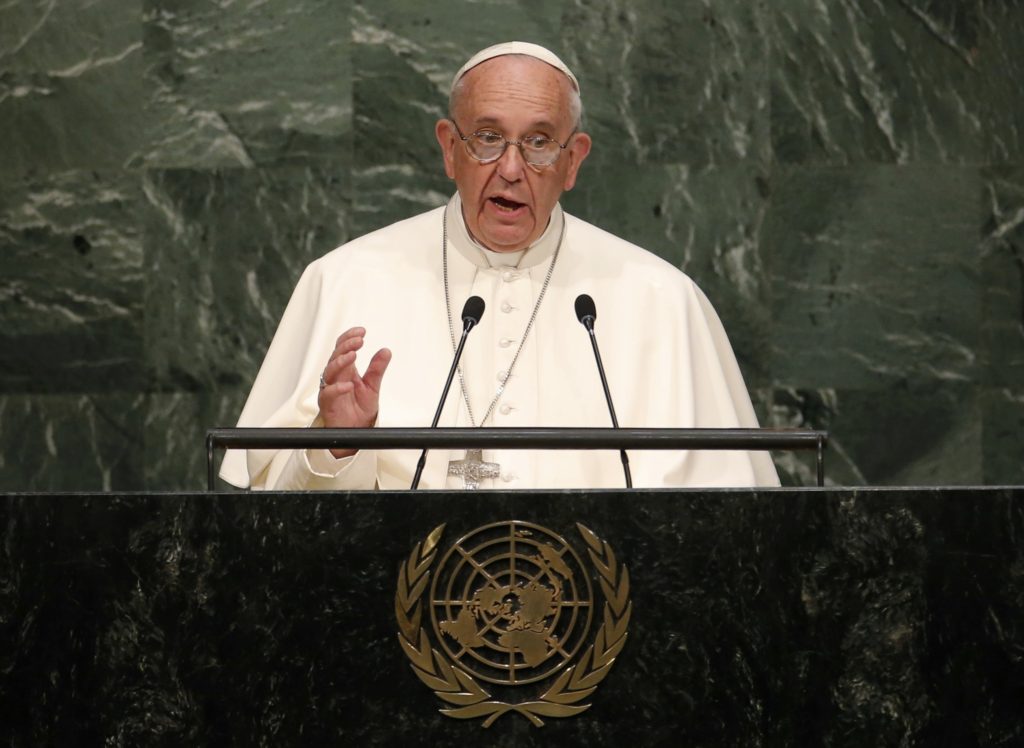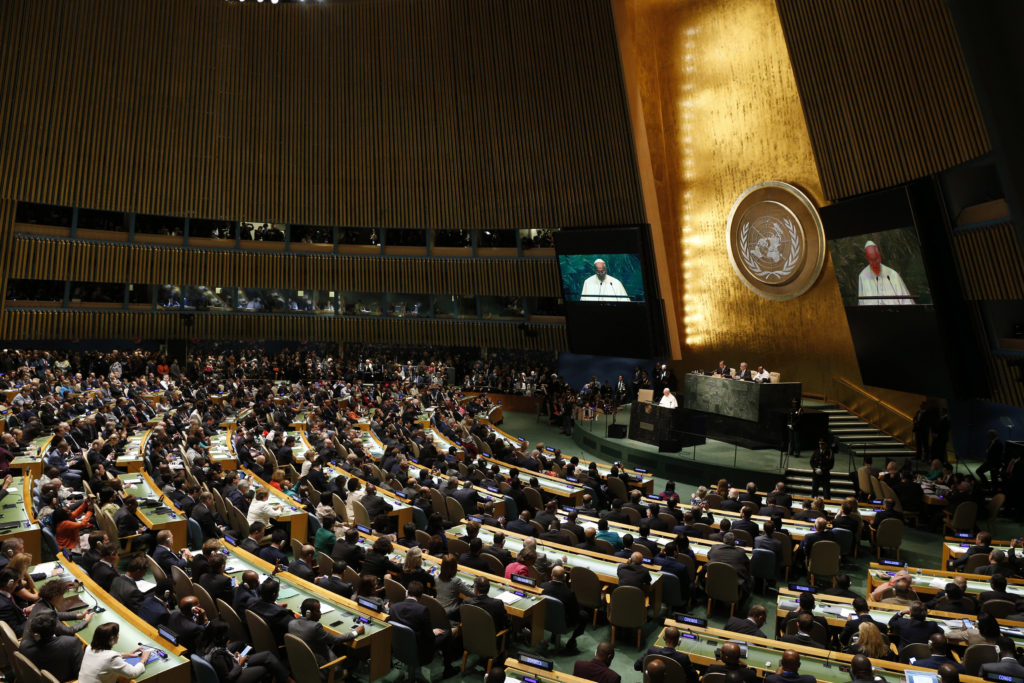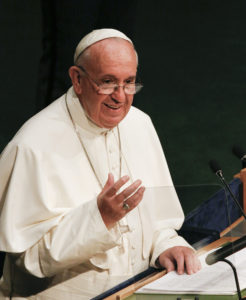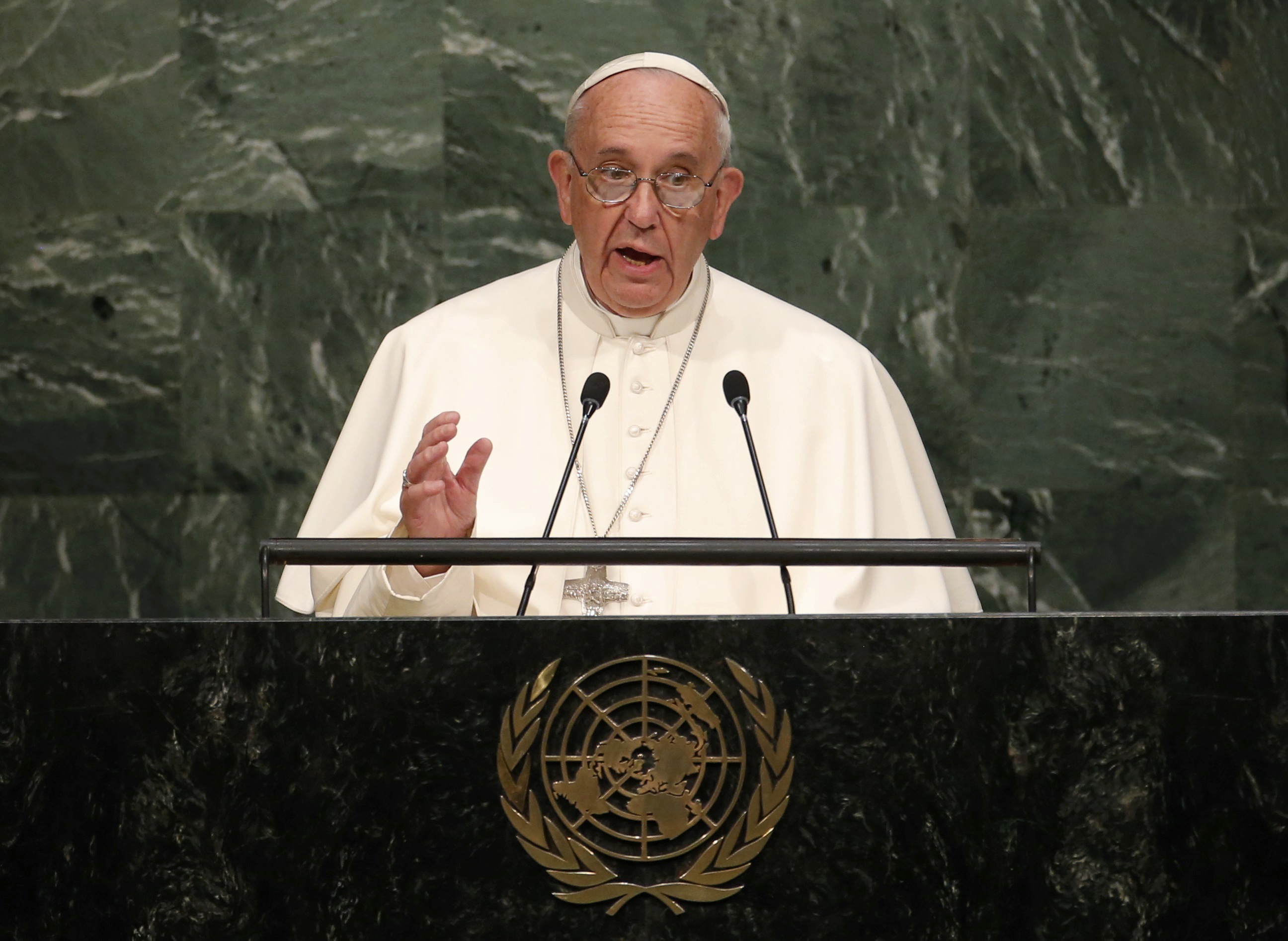
UNTIED NATIONS (CNA/EWTN News) — On Friday Pope Francis told members of the United Nations that there is no room for “ideological colonization” in their agenda, and stressed the need to go beyond policies to concrete solutions in caring for the poor and vulnerable, as well as the environment.
In his Sept. 25 speech to a U.N. General Assembly Special Summit on Sustainable Development, Pope Francis pointed to the Preamble of the U.N. Charter, which highlights the need to promote “social progress and better standards of life in larger freedom.”
In the 70 years since the U.N.’s founding in 1945 until now, both the effectiveness of fully implementing their international norms as well as the ineffectiveness of their lack of enforcement can be seen, he said.
“When the Charter of the United Nations is respected and applied with transparency and sincerity, and without ulterior motives, as an obligatory reference point of justice and not as a means of masking spurious intentions, peaceful results will be obtained,” the pope said.
However, when the norms are merely used as “an instrument to be used whenever it proves favorable, and to be avoided when it is not, a true Pandora’s box is opened, releasing uncontrollable forces which gravely harm defenseless populations, the cultural milieu and even the biological environment.”
Enthusiasm for the pope was palpable among the global leaders gathered for his address Friday morning, as claps frequently punctuated his remarks.
His visit marks the fifth time a pope has visited the U.N., following Bl. Pope Paul VI in 1965, Pope St. John Paul II in 1979 and 1995, and Pope Emeritus Benedict XVI in 2008.
In addition to his strong comments against ideological colonization, Francis also voiced condemnation for global phenomena such as the arms trade, the use of nuclear arms and weapons of mass destruction, drug trafficking, war, environmental deterioration and social exclusion.
He praised the U.N. for the work that has been done in the 70 years of its existence, and pointed to specific initiatives such as the codification and development of international law, the establishment of international norms regarding human rights, advances in humanitarian law, the resolution of conflicts and peacekeeping operations as “lights” dispelling the darkness of selfishness.
However, while much has already been done, there are still serious problems that need to be resolved, he said.
The pope voiced concern that while our emphasis on communications and technology help surpass distances, they also bring the temptation to “overcome all natural limits to the exercise of power.”
“To give to each his own, to cite the classic definition of justice, means that no human individual or group can consider itself absolute, permitted to bypass the dignity and the rights of other individuals or their social groupings.”


He noted that “the right of the environment” does exist since human beings are part of the environment and since every living creature has an intrinsic value.
Creation itself “entails ethical limits which human activity must acknowledge and respect,” he said, adding that since man has “a body shaped by physical, chemical and biological elements, and can only survive and develop if the ecological environment is favorable,” any harm done to the environment, “therefore, is harm done to humanity.”
Destruction of the environment is always accompanied by exclusion, he said, explaining that the uncontrolled thirst for power leads to the misuse of natural resources and the exclusion of the weak and vulnerable.
“Economic and social exclusion is a complete denial of human fraternity and a grave offense against human rights and the environment. The poorest are those who suffer most from such offenses.”
The poor, he said, “are cast off by society, forced to live off what is discarded and suffer unjustly from the abuse of the environment. They are part of today’s widespread and quietly growing culture of waste.”
He said the 2030 Agenda for Sustainable Development is a “sign of hope” in this area, and voiced his confidence that the Paris Conference on Climatic Change will also yield effective agreements.
But while policies are good, Francis said they aren’t enough, and stressed that commitments must also be coupled with the will to carry them out.
“Our world demands of all government leaders a will which is effective, practical and constant, concrete steps and immediate measures for preserving and improving the natural environment,” he said.
Doing this will help put an end to various forms social and economic exclusion, along with their “baneful consequences” such as human and organ trafficking, the drug and weapons trade, terrorism and organized crime.
He said that human development and dignity can’t be imposed, but must naturally be built up by each individual and family, leading to the development of other areas of life such as communities, towns, cities, schools and businesses.
Education, particularly for girls, which is excluded in some countries, is also a fundamental right which must be upheld, the pope said. He drew special attention to the right of the family to education their own children, as well as the right of churches and social groups to support and help families.
Government leaders, he said, “must do everything possible to ensure that all can have the minimum spiritual and material means needed to live in dignity and to create and support a family, which is the primary cell of any social development.”
Francis said that this minimum has three names: “lodging, labor and land,” and one spiritual name: “spiritual freedom, which includes religious freedom, the right to education and other civil rights.”
The best indication the implementation of the new development agenda will be effective, he said, will be if every person has access to the basic and fundamental material and spiritual goods, such as housing, work, food and water, religious and spiritual freedom, and education.
When we ourselves have the final word and no longer recognize anything but ourselves, creation is compromised, he said.
Therefore, “defense of the environment and the fight against exclusion demand that we recognize a moral law written into human nature itself, one which includes the natural difference between man and woman and absolute respect for life in all its stages and dimensions.”
Francis then pointed to the global conflicts in the entire Middle East, North Africa and other African countries, saying that they serve as an obvious example of uncoordinated military and political interventions among the international community.
The atrocities carried out against religious minorities and innocent persons caught in the middle of conflict “should serve as a grave summons to an examination of conscience on the part of those charged with the conduct of international affairs,” the pope said.


“Human beings take precedence over partisan interests, however legitimate the latter may be. … Human beings who are easily discarded when our only response is to draw up lists of problems, strategies and disagreements.”
Pope Francis then turned to the topic of nuclear arms and weapons of mass destruction, saying their use and proliferation go directly against the U.N.’s preamble, which calls for the promotion of “peace, the pacific solution of disputes and the development of friendly relations between the nations.”
“An ethics and a law based on the threat of mutual destruction — and possibly the destruction of all mankind — are self-contradictory and an affront to the entire framework of the United Nations,” the pope said, and urged them to work for a world free of nuclear weapons.
He then praised the recent nuclear deal struck between the U.S. and Iran, calling proof “of the potential of political good will and of law.”
“I express my hope that this agreement will be lasting and efficacious, and bring forth the desired fruits with the cooperation of all the parties involved.”
Finally, Francis turned to the silent but deadly phenomena off drug trafficking, which by its nature includes human trafficking, money laundering, the arms trade, child exploitation and widespread corruption.
Our common home, he said, must constantly rise on the foundations “of a right understanding of universal fraternity and respect for the sacredness of every human life, of every man and every woman, the poor, the elderly, children, the infirm, the unborn, the unemployed, the abandoned (and) those considered disposable because they are only considered as part of a statistic.”
Due to the growing fragmentation of the world, the pope said that certain agendas can’t be postponed for the future. Rather, the future requires from each of us both “critical and global decisions” in the face of global conflicts and exclusion.
Although the U.N. has many opportunities for improvement, Francis said that it is necessary in order to create a secure and happy future for coming generations.
It can and will do this, he said, “if the representatives of the States can set aside partisan and ideological interests, and sincerely strive to serve the common good.”
Pope Francis closed by assuring those gathered of his support and prayer, as well as that of the entire Church.
He gave his blessing, and prayed that the U.N., as well as all of its member states and officials, will always render an effective service to mankind, a service respectful of diversity and capable of bringing out, for the sake of the common good, the best in each people and in every individual.”






